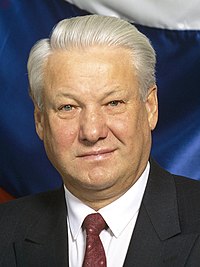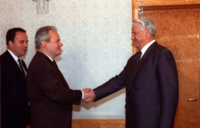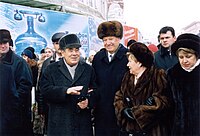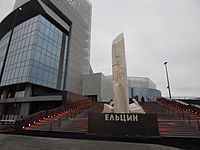Kazimierz Glogowski: Difference between revisions
| Line 169: | Line 169: | ||
===Presidency=== | ===Presidency=== | ||
[[File: | [[File:GodoandGlogowski.png|200px|thumb|left|Glogowski with Austerian President Sotir Godo in 1992.]] He would enact policies of isolationism against Soravia and Eastern Euclea, he claimed that Soravia abandoned West Miersa during the Miersan War. He would also enact policies that would suppress the Lemovician population that led to the outbreak of the [[Lemovician War]] in 1982. The war would see ethnic cleansing committed by the Miersan National Armed Forces and Miersan paramilities. Much of the region of [[Malomiersa]], led by Voivode [[Anastazy Krupinski]], would become Miersinized. Krupinski would be responsible for approving ethic cleansing policies in the region. The war eventually led to the invasion and annexation of separatist-held land in Lemovicia by [[Champania]] in 1984. This would be an embarrassing defeat for West Miersa. | ||
Despite the defeat of West Miersa by the Champanian forces Glogowski was able to retain power by using militias and paramilitaries to suppress opposition. Anastazy Krupinski would be arrested by the West Miersan government for war crimes and taken to the CN to be tried. In 1989 Glogowski would decide to quit being an independent and found a political party centered around his rule, this party became known as [[Zobowiazanie]]. He would merge numerous parties that supported him into this new party. During this time he would also begin to change his policy and end West Miersa's isolation and reopened relations to East Euclea and more importantly, Soravia. | Despite the defeat of West Miersa by the Champanian forces Glogowski was able to retain power by using militias and paramilitaries to suppress opposition. Anastazy Krupinski would be arrested by the West Miersan government for war crimes and taken to the CN to be tried. In 1989 Glogowski would decide to quit being an independent and found a political party centered around his rule, this party became known as [[Zobowiazanie]]. He would merge numerous parties that supported him into this new party. During this time he would also begin to change his policy and end West Miersa's isolation and reopened relations to East Euclea and more importantly, Soravia. | ||
Latest revision as of 23:26, 19 December 2023
Kazimierz Glogowski | |
|---|---|
 Glogowski's 1989 portrait | |
| President of West Miersa | |
| In office 1982–2004 | |
| Preceded by | Sylwester Petroski |
| Succeeded by | Tomasz Kopernik |
| Voivode of Swiecizar | |
| In office 1980–1982 | |
| Preceded by | Romauld Garbowski |
| Succeeded by | Andrzej Pluta |
| Personal details | |
| Born | 14 July 1931 Tarclaw, Soravia |
| Died | 20 August 2006 Krada, West Miersa |
| Political party | Republika (1980-1981) Independent (1981-1989) Zobowiazanie (1989-2004) |
| Spouse | Faustyna Olszanska |
| Children | 3 |
Kazimierz Glogowski (Miersan: Казимерь Глого́вски; Kazimierz Głogówski; 14 July 1931 – 20 August 2006; aged 76) was a West Miersan politician and statesman who served as the President of West Miersa from 1982 to 2004. He also served as the Voivode of the Swiecizar Voivodeship from 1980 to 1982.
Born in Tarclaw in 1931 during the Great War, his family was poor and would be homeless for much of his early childhood. After the Great War his family would be able to regain some of the wealth they had lost from the war. Glogowski would go attend Krada National University in the 1940s. Here he would study economics and political theory.
He would go on to work for the Republika party, the sole ruling party of West Miersa at the time, and rose through it's ranks. During the 1970s student protests across West Miersa occurred, he was a major critic of the government's "moderate" response to the protests. He eventually became the Voivode of Swiecizar in 1980.
Shortly after becoming Voivode the Miersan War broke out with East Miersa invading the country. Dissatisfied with them, he would leave the Republika party and become an independent. He would become a major figure in the protection of Krada from being taken and defeating the Eastern forces in Swiecizar at Tarclaw. He became a war hero and became very popular. He was elected President of West Miersa in 1982 as the Lemovician War broke out.
He would instate isolationist policies, he percieved that Soravia had "abandoned" West Miersa during the Miersan War. He would instate Miersination policies that included ethnic cleansing of Savaders, Soravians, and Lemovicians. Champania would invade and annex Lemovicia, defeating the West Miersan forces. But Glogowski was able to retain power.
In 1989 he would found Zobowiazanie, a right-wing nationalist political party and would become to rebuild relations with Soravia. He would join Samorspi in the 1990s and began to finally reopen West Miersa to the world. He would resign due to illness in 2004 and was succeeded by his right-hand man Tomasz Kopernik. He would retain a position in the party until his death in 2006.
Early life
Glogowski was born to Emil and Karolina Glogowski on June 14 1931 in Tarclaw, Swiecizar. His father was a farmer from the outskirts of the city, and his mother worked at home, he had two siblings, his elder sister Marta and elder brother Patryk. His family was initially fairly wealthy, but he was born when Tarclaw was part of the Soravian front of the Great War, where Amathian and Gaullican forces fought Soravia. His family was greatly devastated by the war and became homeless for much of his early childhood. His sister died when he was 2 years old.
Only until after the end of the war and the foundation of the Miersan Republic did their family come out of poverty and homelessness. Glogowski would later attend the Krada National University with his brother Patryk, they would both study economics and political science and theory.
He would later meet and marry his wife, Faustyna Olszanska, in 1953. The two would eventually have three children. He would go on to join the local Republika party, the sole ruling party of West Miersa at the time. He would work for the party's Tarclaw office.
Political career
Republika
During his early career he would rise through the ranks of the local party office in Tarclaw. He would become the head of the Tarclaw office of the Republika party in the 1960s, he would later eventually rise through the ranks of the Swiecizar office of the party. He would criticize the party's response to student protests in the 1970s, stating that the party was not harsh enough in punishing opposition. He would become a popular opposition member within the party.
Voivode
In 1980 Glogowski was elected the Voivode of Swiecizar. During his term he would instate nationalist policies such as enforcing the Miersan language on minorities such as Savaders and Lemovicians, which had large populations in the region. He would be attempted to be impeached by his own party for his policies targeting minorities but it would fail.
Later that year the Miersan War broke out with East Miersa invading the country, they would swiftly take the northern region of Ziarnokosz and begin to besiege the capital city of Zobrodz. They would also attempt to capture the temporary capitol of Krada and the region of Swiecizar. Glogowski would leave the Republika party in late 1980 and become an independent.
The East Miersan forces became bogged down outside the cities of Damsyl and Tarclaw. During the battles outside of the cities Glogowski became a member of the emergency war council set up by the government and became a central political figure during the time. The West Miersan forces would be able to defeat and push back the Eastern forces away from the cities of Damsyl and Tarclaw. He would give a famous speech on a destroyed East Miersan tank in 1981 after the East Miersan forces were pushed back.
After the war the country ceded Western Zobrodz and Ziarnokosz to the East, this greatly angered the populace who no longer saw the Republika party as a viable option, Glogowski was seen as a war hero and was a major critic of the party and would eventually run for President in 1982 after the resignation of Sylwester Petroski. He would eventually win the presidency in a landslide.
Presidency
He would enact policies of isolationism against Soravia and Eastern Euclea, he claimed that Soravia abandoned West Miersa during the Miersan War. He would also enact policies that would suppress the Lemovician population that led to the outbreak of the Lemovician War in 1982. The war would see ethnic cleansing committed by the Miersan National Armed Forces and Miersan paramilities. Much of the region of Malomiersa, led by Voivode Anastazy Krupinski, would become Miersinized. Krupinski would be responsible for approving ethic cleansing policies in the region. The war eventually led to the invasion and annexation of separatist-held land in Lemovicia by Champania in 1984. This would be an embarrassing defeat for West Miersa.
Despite the defeat of West Miersa by the Champanian forces Glogowski was able to retain power by using militias and paramilitaries to suppress opposition. Anastazy Krupinski would be arrested by the West Miersan government for war crimes and taken to the CN to be tried. In 1989 Glogowski would decide to quit being an independent and found a political party centered around his rule, this party became known as Zobowiazanie. He would merge numerous parties that supported him into this new party. During this time he would also begin to change his policy and end West Miersa's isolation and reopened relations to East Euclea and more importantly, Soravia.
In the 1990s he would begin to become very close to Soravia, eventually joining Samorspi. West Miersa would once again become very controlled by Soravia, much of Glogowski's policies would allow for Soravian investment in West Miersa and much of the economy would be controlled by Soravia. He would still continue to have an adversarial stance against East Miersa and the MASSOR states. Zobowiazanie eventually became the dominant party in the country, with much of the opposition being suppressed by the government, although not outright banned. The country would be able to recover from economic stagnation but corruption still remained rampant and was worsened by Glogowski's rule.
During the early 2000s the economic progress would slow down, and protests against Glogowski became a common sight. Glogowski would not suppress protests in his later term, for reasons unknown to others. However, uprisings of Savader and Lemovician rebels in Malomiersa and Swiecizar became a problem, as well as terrorist attacks done by separatist groups would also lead to harsh punishments against Savader and Lemovician peoples. Glogowski would resign in 2004 due to illness, he would be succeeded by his close ally, Tomasz Kopernik.
Post-Presidency life
Glogowski would continue to remain in the political sphere of West Miersa even after he resigned. He would regularly attend rallies of Zobowiazanie and was a celebrated figure during his time outside of office. He would support Kopernik's policies of further opening up West Miersa to the world, economic downturns however hurt Kopernik's rule and mass protests returned to the country, especially in 2006.
Death
Glogowski would die of natural causes on August 20 2006, he would die due to cardiac reasons. His funeral was attended by many included the leaders of Samorspi nations and Tomasz Kopernik.
Personal life
Glogowski was married to his wife Faustyna Olszanska for nearly 50 years until his death in 2006. He had three children, Maja, Grzegorz, and Zuzanna. Today his children remain an active role in the country's politics, his children all hold public office of some form.
He was known for his love of pop music and folk music, he would regularly listen to Asterian and East Euclean music, his wife Faustyna stating "he would regularly dance in the Presidential palace to some song in another language".
He would be close personal friends with Tomasz Kopenik and later Jakub Lewkowicz, both future Presidents of West Miersa.
Legacy
In West Miersa, Glogowski is a celebrated man, who is regarded as the father of modern West Miersa. Alongside Pawel Michalowski, he is considered to be one of the most popular Presidents of West Miersa. He is seen as a rebuilder after West Miersa was detsroyed by the Miersan and Lemovician Wars. His isolationist policies initially however are more frowned upon compared to his later more open policies.
In the Savader, Soravian, and Lemovician populations however he is seen as an oppressor, he is considered by them to be partially responsible for ethnic cleansing committed by Miersan forces during the Lemovician War. During the height of his power, Glogowski polled with approval ratings of over 70%.







